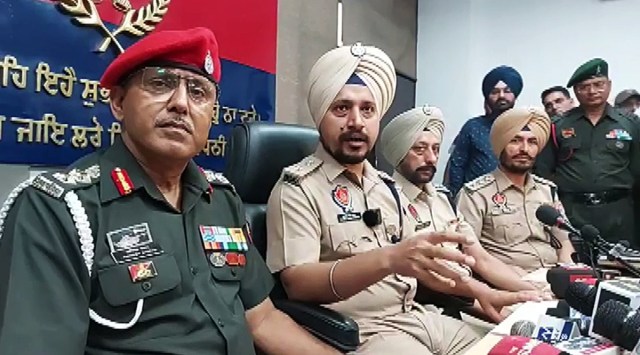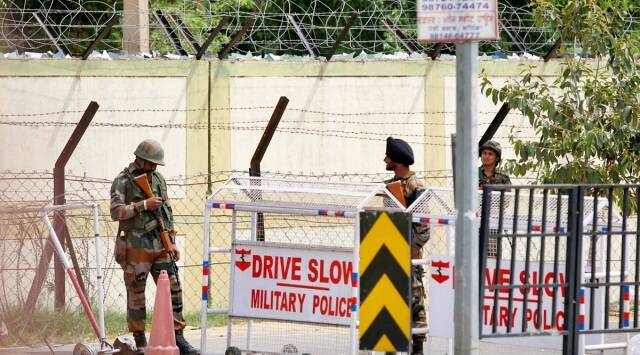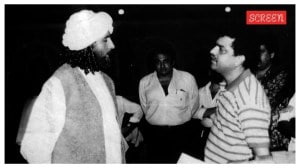Soldier held for Bathinda killings; probe points to revenge for sexual abuse
Punjab Police and the Army HQ South Western Command did not disclose the exact reason for the killing, saying the soldier shot dead his four colleagues “due to personal reasons/animosity”.
 Bathinda SSP Gulneet Khurana (centre) addresses a press conference on the military station incident on Monday. (ANI)
Bathinda SSP Gulneet Khurana (centre) addresses a press conference on the military station incident on Monday. (ANI) An Army soldier has been arrested on the charge of killing four fellow soldiers in their sleep early April 12 at the Bathinda Military Station in Punjab.
On Monday, Punjab Police and the Army HQ South Western Command did not disclose the exact reason for the killing, saying the soldier shot dead his four colleagues “due to personal reasons/animosity”.
Sources in the police, however, claimed that the soldier, a Gunner from the 80 Medium Regiment of the Artillery, had said he was repeatedly assaulted sexually over a period of time and shot dead the four soldiers in an act of revenge.
The soldier, police said, was an eyewitness who had falsely stated that he had seen two masked persons, clad in kurta pyjamas, running into a nearby forest after the killings in the early hours of April 12. He did that to mislead investigating agencies.
Addressing a press conference, Bathinda SSP Gulneet Singh Khurana confirmed the arrest of the soldier from the 80 Medium Regiment.
 Indian Army soldiers stand next to a barricade outside a military base, after a firing incident in Bathinda, April 12, 2023. (Reuters/File)
Indian Army soldiers stand next to a barricade outside a military base, after a firing incident in Bathinda, April 12, 2023. (Reuters/File)
Khurana, however, declined to reveal the exact reason why the Gunner shot dead his colleagues. “All I can say is that there are personal reasons which we cannot disclose to the media and I would request you to not ask further,” he said.
According to the SSP, further investigation will be conducted after securing the remand of the accused from court.
Khurana said the rifle used in the crime was dumped in a sewage pit by the soldier along with some ammunition and a misfired cartridge. These, he said, had been recovered.
“The accused was also found to be making inconsistent statements during the inquiry being conducted by the Army and this gave us reason to suspect him,” the SSP said.
A police officer, who did not wish to be named in this report, said that on the night of the killings, the Gunner checked twice to see if his four colleagues had gone to sleep. “The jawans slept around 2 am. He checked on them at 3 am and then at 4 am, before committing the crime with the rifle he had stolen a few days earlier from a nearby sentry post,” the officer said.
The Army had launched a manhunt at the Bathinda Military Station after the killings.
The HQ South Western Command, in a statement, said the Gunner, after “sustained interrogation” had “confessed” to police about “his involvement in stealing an INSAS rifle and killing four of his colleagues”. It said “initial investigations indicate that this was apparently due to personal reasons/animosity”.
According to the statement, the Gunner, in his confession, said he stole the weapon along with a filled magazine early April 9 morning and hid it.
Around 4.30 am on April 12, while he was on sentry duty, he recovered the weapon from the hiding place, moved to the first floor, and killed all four personnel while they were asleep, the statement said.
The Gunner then threw the weapon into a sewage pit from where it was recovered along with additional ammunition, the statement said, adding that his subsequent claim that he had seen two persons in civil dress with an INSAS rifle and axe “was an attempt to divert attention of investigating agencies”.
“It is reiterated that there is no terror angle… Indian Army practises zero-tolerance to such acts of indiscipline and is committed to ensure that the guilty will get punished as per law. All possible assistance is being provided to Punjab Police and other agencies for early conclusion of investigations,” the Command statement said.
Military sources said the Gunner may not have officially complained to the Army about the personal issues he may have faced or spoken about the animosity he had against the soldiers that made him kill them.
A comprehensive grievance redressal mechanism, sources said, exists in the Army in case a formal complaint is lodged by any soldier.
“They are immediately acted upon as they bring a bad reputation to the unit,” a source said. But there have been past instances too, the source said, of people not flagging issues out of stigma or shame.
Even in the absence of an official complaint, there is a comprehensive system in place to identify a soldier in distress.
There is a buddy system where every soldier is attached to another soldier or a buddy and each keeps an eye on the other to identify any tell-tale sign of distress.
At times, soldiers confide in religious teachers and their problems are then conveyed to the Subedar Major and the Commanding Officer. Sainik sammelans are also held for the soldiers to reach out to the CO with their problems.







